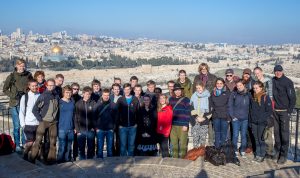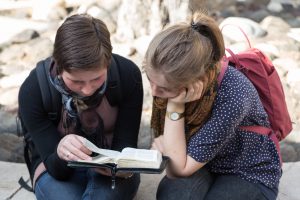From January 16th to 24th this year, 25 students from the Lutheran School of Theology in Aarhus took part in a study tour in Israel together with their professor, Morten Hørning Jensen. I had the privilege of guiding and teaching the group throughout the program, together with Morten. It was like getting back to what I did—and enjoyed very much—in the ’90s, as a Caspari Center staff member with responsibility for international programs like this one.
 The program was planned in cooperation with Caspari Center and was executed with some practical help from Caspari staff. Part of the group roomed at the CMA guest house (in the same building as the Caspari Center); the rest stayed at a nearby hostel.
The program was planned in cooperation with Caspari Center and was executed with some practical help from Caspari staff. Part of the group roomed at the CMA guest house (in the same building as the Caspari Center); the rest stayed at a nearby hostel.
For some of the students this was their first visit to Israel, others had been there before. But it was the first time that all of them engaged with the biblical text and theological questions using the unique settings of Jerusalem and the rest of the country as their classroom. The students discovered new aspects and insight to the biblical texts, especially through the people and also through the places. Different theological issues came to light and stirred new discussions where old views and answers had to be revisited. Even church history came alive!
The first two days were spent in Jerusalem and two themes were pursued: 1) The temple in the Old and New Testaments, and 2) the last days of Jesus in Jerusalem.
The next three days took us out of the city and into the desert, and included a hike from the St. George Monastery to Jericho. Spending one morning doing that was very rewarding and provided a great setting for reflection and devotion. It is hard to understand why the desert is such an important place for God and his people without having experienced just a bit of its stillness and vastness.
Two days were spent on the West Bank—one day going south to Bethlehem and Hebron and another day going north through Samaria. Judea and Samaria are part of the same mountain range, but driving from one to the other gives an idea of why the northern kingdom saw so much more idolatry and corruption. Life there is so much easier, the fields are wider and the olives richer. Who needs God when the harvest is plentiful? It was a great reminder of the warning Moses gave the Israelites as they were entering the country: Don’t forget God, who took you out of Egypt and slavery!
Such lessons are much harder to learn sitting in a classroom and only reading the texts. Going through the land and experiencing it, they make so much more sense.
The last days were spent in the Galilee in the footsteps of Jesus, asking ourselves what the kingdom he proclaimed was all about. What would it take for his disciples to leave the well-established family fishing business to follow a young preacher? What does it take for students of theology to be followers of the same Messiah and his kingdom and live a life of discipleship today?
One of the reactions to the study tour from several of the students was, “We thought we knew but now, seeing places and talking to people, we realize that we didn’t know it all and there are issues we need to rethink.” Getting to that point takes so much longer when you only have your classroom. It was only a ten-day study tour—but thanks to the Caspari Center, it was definitely worth it.
Bodil F. Skjott is the director of the Danish Israel Mission. Bodil served as International Studies Director at the Caspari Center from 1999-2004.
If you, too, would like to take part in a horizon-broadening study tour, join the Caspari Center’s next Missiology Course, November 3-14, 2014.